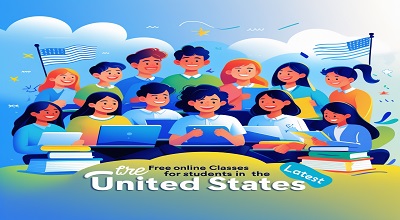Online Classes for Students in the United States
Online Classes for Students in the United States: The digital revolution has transformed education, making learning more accessible than ever. Free online classes provide students in the United States with opportunities to enhance their knowledge, develop new skills, and even earn certifications without financial barriers. From academic subjects to professional development courses, numerous platforms offer high-quality education at no cost.
Benefits of Free Online Classes
A. Accessibility and Flexibility
Online classes allow students to learn at their own pace, anytime and anywhere. This is especially beneficial for working professionals and those with busy schedules.
B. Cost-Effective Learning
Free courses eliminate tuition fees, textbook costs, and commuting expenses, making education more affordable.
C. Diverse Course Offerings
Students can choose from a wide range of subjects, including STEM, humanities, business, and vocational training.
D. Skill Development and Career Advancement
Many free courses offer certifications that can enhance resumes and improve job prospects.
Top Platforms Offering Free Online Classes
Here are some of the best platforms providing free online education:
A. Coursera
- Offers free courses from top universities like Stanford and Yale.
- Example: “Introduction to Psychology” (Yale University)
B. edX
- Provides free courses from MIT, Harvard, and other institutions.
- Example: “CS50’s Introduction to Computer Science” (Harvard University)
C. Khan Academy
- Free K-12 and college-level courses.
- Example: “AP Calculus AB”
D. Udemy (Free Courses Section)
- Select free courses on coding, marketing, and personal development.
- Example: “Python for Beginners”
E. MIT OpenCourseWare
- Free access to MIT’s course materials.
- Example: “Introduction to Electrical Engineering and Computer Science”
F. Google Digital Garage
- Free digital marketing and career skills courses.
- Example: “Fundamentals of Digital Marketing”
G. Codecademy (Free Tier)
- Interactive coding lessons.
- Example: “Learn HTML & CSS”
Free Online Classes by Subject
A. STEM (Science, Technology, Engineering, Mathematics)
- Coursera: “Machine Learning” (Stanford University)
- Khan Academy: “High School Biology”
B. Business & Finance
- edX: “Financial Analysis and Decision Making” (Babson College)
- Google Digital Garage: “Data, Economics, and Development Policy”
C. Humanities & Social Sciences
- MIT OpenCourseWare: “Introduction to Philosophy”
- Coursera: “The Science of Well-Being” (Yale University)
D. Arts & Creativity
- Udemy: “Photography Masterclass” (Free Version)
- Khan Academy: “Art History”
E. Professional Development
- LinkedIn Learning (Free Trials Available): “Time Management Fundamentals”
- Alison: “Diploma in Project Management”
How to Enroll in Free Online Classes?
- Choose a Platform (e.g., Coursera, edX, Khan Academy).
- Browse Courses and filter by “Free” options.
- Create an Account (if required).
- Enroll and start learning immediately.
- Complete the Course and download certificates (if available).
Success Stories from Free Online Learning
- John D., a high school student, learned Python through Codecademy and secured an internship.
- Sarah K. completed Google’s Digital Marketing course and started her own freelance business.
Challenges and Solutions in Online Learning
Challenges:
- Lack of motivation
- Limited instructor interaction
- Technical issues
Solutions:
- Set study schedules
- Join online study groups
- Use reliable internet and devices
Future of Free Online Education
With advancements in AI and virtual classrooms, free online education will continue to expand, offering more interactive and personalized learning experiences.
Conclusion
Free online classes provide incredible opportunities for students in the U.S. to learn, grow, and advance their careers without financial constraints. By leveraging these resources, anyone can gain valuable knowledge and skills.
FAQs
Q1. Are free online classes really free?
Yes, many platforms offer completely free courses, though some may charge for certifications.
Q2. Can I get a certificate for free?
Some platforms (like Coursera and edX) provide financial aid for certificates. Others, like Khan Academy, offer free completion badges.
Q3. Are these courses accredited?
Most free courses are not accredited, but they provide valuable knowledge and skills.
Q4. How much time do I need to dedicate?
It varies—some courses take a few hours, while others may require weeks of study.
Q5. Can free online courses help in getting a job?
Yes, many employers recognize certifications from reputable platforms like Google and Coursera.
